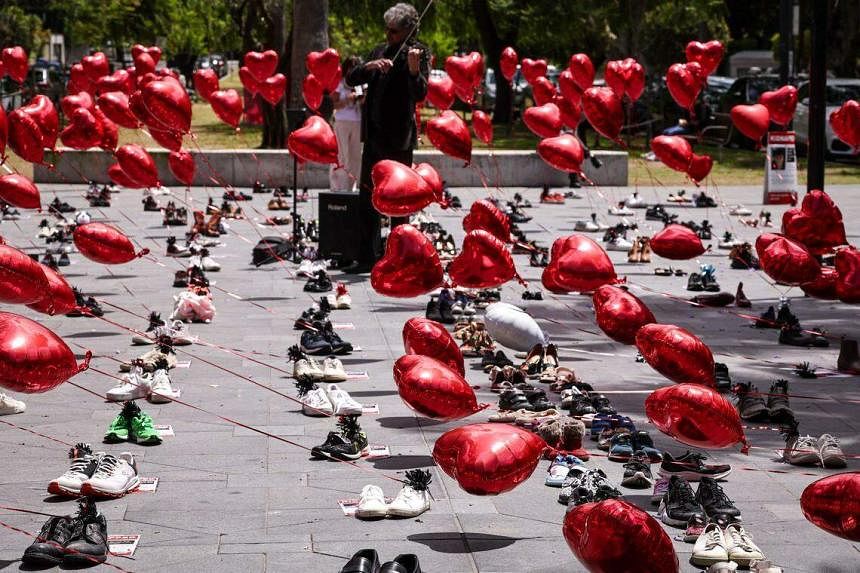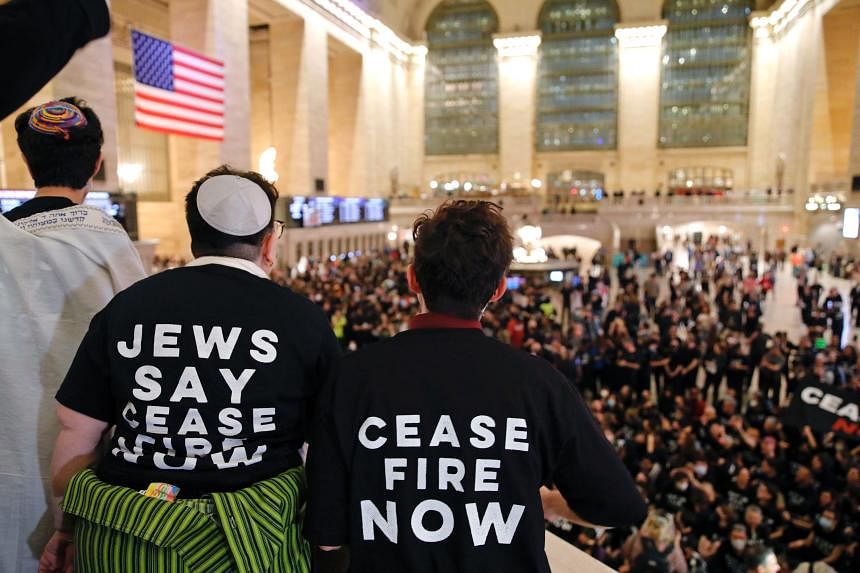WASHINGTON/SYDNEY – Many Jewish people in the United States are deeply worried about rising anti-Semitism, supercharged by the war between Israel and Hamas that has inflamed passions on all sides to an intensity not seen in recent memory.
But there is division within the Jewish community too.
Across the world, the war that began with a bloody incursion by Hamas militants inside Israel that left 1,400 Israelis dead has affected Jewish, Palestinian and wider Arab communities in varying ways.
In Germany, the authorities are cracking down on pro-Palestinian demonstrations, which are banned.
But some in the country’s political left have questioned this, arguing that the bans silence legitimate concerns about Israel’s relentless retaliatory bombardment of the Gaza Strip.
Guilt over its own history, however, drives Germany’s official position.
Visiting Israel on Oct 17, German Chancellor Olaf Scholz said: “History and our responsibility arising from the Holocaust make it our duty to stand up for the existence and security of Israel”.
In an article posted on Oct 19, the European Council on Foreign Relations warned about the dangers of the situation in France.
“With its large Jewish and Muslim communities, and a fraught colonial past in the Middle East and North Africa, France is being torn apart by the events in Gaza and Israel,” it said.
“While the war in Ukraine generated a rare consensus within the French population and political class, the war in Gaza may expose the strong divides that underpin it.”
France is home to around six million Muslims, mostly of North African descent, who have long been sympathetic to the Palestinian cause.
“The ongoing destruction caused by the Israeli siege of Gaza has triggered personal and deep-seated anger within France’s Muslim community,” the article warned.
“The French authorities fear another outburst of violence may be imminent,” it said. “In particular, there are grave concerns that France’s Jewish community, which is the largest in Europe, may be targeted. Over a hundred anti-Semitic acts were reported in the five days following the Hamas attack.”
The Jewish population in France is estimated to be over 500,000.
Across the Atlantic, anger is erupting in the United States, home to an estimated 7.5 million Jews.
Last Wednesday, at the liberal Cooper Union College in New York City, a group of Jewish students locked themselves inside the library as protesters outside chanted “Free Palestine” and pounded on the doors.
The previous night in Washington, on the outer wall of a library building at George Washington University, a projector beamed phrases including “Glory to our martyrs”.
There are calls to expel the students involved in the projection.
The Anti-Defamation League (ADL), a New York-based Jewish non-governmental organisation that tracks anti-Semitism, said last Tuesday that reported incidents of harassment, vandalism and assault against Jewish people in the US had increased by 388 per cent over the same period in 2022.
This was since the Hamas attack on Oct 7 initiated the current wave of violence and reprisals, which has seen more than 7,000 Palestinians killed in Gaza, according to figures released by the Health Ministry there.
The ADL said it recorded a total of 312 incidents between Oct 7 and last Monday, of which 190 were directly linked to the war in Israel and Gaza.
In Australia – another immigrant society where the relatively small Jewish community includes refugees from the Holocaust and their descendants – Hamas’ rampage also revived memories of brutalities past.
There are around 100,000 Jews in Australia.
In the days after the attack, a pro-Palestinian rally at the Opera House in Sydney featured anti-Semitic chants such as “gas the Jews” and “death to the Jews”.
Jews were advised by the authorities to stay away from the rally for their safety – a move that was widely criticised, triggering an apology to the Jewish community from New South Wales Premier Chris Minns.
As in the US, Jewish and Muslim groups in Australia have reported an increase in anti-Semitic and Islamophobic attacks.
Security has been stepped up at Jewish schools and synagogues, and at mosques, with the help of an extra A$10 million (S$8.7 million) from the federal government.
Mr Peter Wertheim, co-chief executive of the Executive Council of Australian Jewry, which represents the Australian Jewish community, acknowledged that the state and federal authorities had “gone to great lengths to stand with the Jewish community at this anxious time”.
“The carnage in Israel and the disgraceful displays of anti-Semitism… evoke powerful historical memories in the Jewish community, especially among our Holocaust survivors and descendants (of whom we have the highest percentage of any Jewish community outside Israel),” he told The Straits Times.
While there are scattered voices of dissent from Jews who have condemned Israel’s attacks on Gaza, the response from representative bodies and the strong attendance at public rallies suggest the community in Australia is largely unified in backing Israel.
The Jewish community has held emotive rallies in Sydney, Melbourne and Perth, attended by thousands, to express solidarity with Israel.
“Though we may be far away, our hearts and our prayers are with the people of Israel,” Mr David Ossip, president of the New South Wales Jewish Board of Deputies, said at the Sydney rally on Oct 11.
“We gather here, the Jewish people, to strengthen one another, to fortify one another,” he said.
Some Australians have been directly affected by the Hamas attacks, including hundreds evacuated on repatriation flights arranged by the federal government.
One of those murdered by Hamas was Ms Galit Carbone, a 66-year-old Sydney-born grandmother who was killed near her home at a kibbutz in Israel.
Australia’s Jewish community has also launched fund-raising schemes to support Israel and provide medical equipment and aid to survivors of the Hamas attack and victims’ families.
The Jerusalem Post last week reported that Jewish people globally had raised hundreds of millions of dollars for Israel.
Of these funds, at least US$70 million (S$96 million) was raised by the United Jewish Appeal-Federation of Jewish Philanthropies of New York.

Dissent in the US has been more open – but middle ground is hard to find.
The war has brought long-running fissures in American, and Jewish American, society to the fore.
“What was so striking was to see how fast we were turning on each other – how we became obsessed not with what should actually be done, or even what was actually being done, but with what was and could be said, and by whom,” said Jewish American podcaster Ezra Klein.
Jewish American professor of American studies Glenn Altschuler at Cornell University told ST: “The fissures divide, in some instances, Jews and non-Jews who are staunchly pro-Israel, from Jews and non-Jews, including those on the progressive left, some African Americans and others, who have strong feelings about Palestinian rights and a Palestinian state.
“It has brought to the surface fissures between progressive and conservative Jews, younger and older Jews, and between Jews for whom a pro-Israel position is a political litmus test – and those who do not believe that is a litmus test.”
That has left many trying to find a way to give voice to horror at the Hamas attack that targeted innocent civilians, but to also place that event in the context of the long struggle for Palestinian rights.
“For many, this is an either/or situation. And if you’re not an either/or kind of guy, you are going to be subjected to serious criticism,” Prof Altschuler said.
Students and faculty at elite colleges and universities have traditionally been sympathetic to Palestinian rights.
But since the war began, donors have pulled funding from universities, and job offers to students have been withdrawn over their political positions.
Those caught in this balancing act are flanked by two sides demonising each other.
“This has meant that some people do not speak out at all... over fears for their own safety,” Prof Altschuler said.
That fear is evident well beyond America.
ST reached out to Jewish organisations in Germany, for instance, and received no response.
But in New York City on Friday, as Israel stepped up its ground operations in Gaza, more than a thousand Jewish people – and others – marched into Grand Central Station demanding an immediate ceasefire.
As they sat down, temporarily blocking the terminal, about 200 were arrested.
Last Wednesday in Washington, a Jewish group called IfNotNow, which advocates an end to US support for Israel and demands “equality, justice, and a thriving future for all Palestinians and Israelis”, held a ceremony for the dead in the war – Israelis and Palestinians alike.
The group unfurled banners calling for a ceasefire. Jewish hymns for the dead were sung, and names of scores of known victims – representing only a part of the death toll – were read aloud.
Under a blue autumn sky, with the US Capitol behind them, the demonstrators took turns to read the names. Some, when reading the names of dead children, wept.

